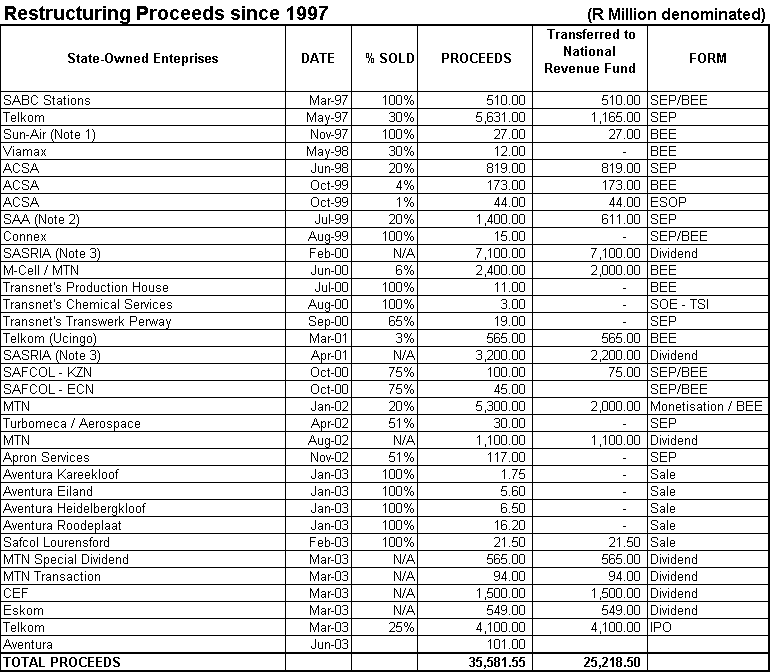
REMARKS BY JT RADEBE, MINISTER OF PUBLIC ENTERPRISES AT THE JOINT MEETING OF THE PORTFOLIO COMMITTEE ON PUBLIC ENTERPRISES AND SELECT COMMITTEE ON LABOUR AND PUBLIC ENTERPRISES HELD IN PARLIAMENT
26 NOVEMBER 2003
Honourable Chairpersons and Members
Members of the Media
It has become tradition for us to brief both Committees on Public Enterprises in Parliament at the beginning of the year, and close the year with a review of the progress we have made. On this occasion I want to make a few remarks based on a long-term view of restructuring since 1999.
It is important to define where we are at the moment. My evaluation comes in the midst of the country’s preparations for the first decade of freedom and democracy in our country where Government is leading other sectors of our society in a review of the past ten years of democratic governance in South Africa.
Anyone who has looked at Government’s Ten Year Review will notice how the economy has transformed since 1994, the extent to which social and other services have been extended to millions of our people for the first time, how the private and public sectors have cooperated to bring development to areas of our country that were previously neglected, and how indeed South Africa is a better place today than it has ever been in its long and tortuous history. …… And that is a fact!
At the same time that we in Government applaud the successes, we are the first to acknowledge that much still needs to be done, that there are still major challenges facing us all, and that the state enterprises sector – which is our concern today – still requires close attention and direction.
It is important that the two Committees on Public Enterprises, based on their own interactions with and assessment of the role of the Department of Public Enterprises as the driver of the Government’s Restructuring Programme, to make a contribution to this review towards the first decade of freedom and democracy.
Public Enterprises should be evaluated in terms of the specific policy objectives of improving the efficiency of SOEs, reduce Government debt, attract investment, ensuring meaningful wider participation in the South African mainstream economy, promote Black Economic empowerment in its broad sense, and increase access to basic services provided by SOEs such as electricity, telephony, transport and water. These are the goals that are outlined in the Government/s Policy Framework on the Restructuring of State-Owned Enterprises we adopted after a wide consultative process in 2000.
The record speaks for itself.

To date, Government has completed over 30 restructuring transactions since 1996. These transactions have raised total gross revenue of R35,6 billion, with over R25 billion being transferred to the National Revenue Fund. I will update this figure for you shortly with a recent windfall!
Through reducing the public debt, together with resources unlocked from the introduction of efficiency measures, we have been able to redirect more funds from interest payments towards social expenditure. This has particularly been the case in Transnet where ongoing financial issues will be the focus of attention for Maria Ramos and her team. At the same time, we should not loose sight of the fact that in terms of financial performance,
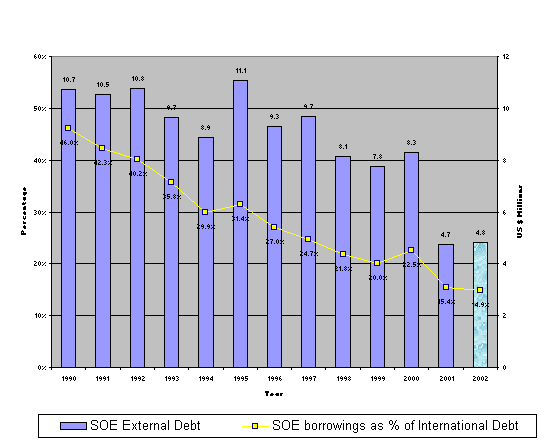
the contribution of SOE debt to national debt has dropped dramatically from over 46% in 1990 to less than 15% today.
Today, millions of our people are having direct access to clean running water, affordable public transport, access to electricity and telephones (Molo Mhlom’wam).
One of the key lessons of the past few years has been the fact that any restructuring that is not handled with care could potentially have negative consequences for our people. For example, the sequencing, pacing and style of introducing efficiency measures could potentially have an impact on the rollout of services such as electricity and water, and employment. Whilst some have complained that we have moved too slowly, for example with the Telkom IPO, or indeed hardly moved at all, with regard to Eskom, we would suggest that Government’s sensitivity to doing things right, and of being conscious of market conditions and other factors beyond our control, has resulted in today’s solid achievements. In fact, in most instances, and with Telkom in particular, the timing could not have been better for investors and the company. I will elaborate further on Telkom just now.
The introduction of efficiency and cost reflective pricing mechanisms could potentially undermine some of the key social objectives outlined in the process. We have been able to manage effectively the commercial and social goals with care that these have not been able to occur in the context of the implementation of our programme.
One of the concerns raised by some of social partners is the impact on the employment within State-Owned Enterprises. Let’s not forget that State-Owned Enterprises contribute some 2% of formal employment in the economy. So we should be cautious when we make suggestions that hundreds of thousands of jobs have been lost in the public enterprises sector as a result of the Government’s Restructuring Programme.
I will be guided by two important factors in making a determination on this particular matter. Firstly, the impact of SOEs on employment cannot be based narrowly on the total number of persons employed directly by SOEs, but rather in terms of the multiplier effect SOEs have on the whole economy. The focus should be on maximizing the multiplier effect for the whole economy, or in simple terms, how the efficient operation of SOEs contributes to growth generally. For example, the efficient operation of South African ports would have a major impact on employment opportunities with companies involved in export and imports.
Secondly, it is important to focus ourselves that in the event where minimum job losses have occurred, these are not caused by policy choices within the context of its restructuring programme. In instances where minimum job losses have occurred, technological changes have been the driver rather than Government’s policy decisions. Thus, the profile of the workforce in SOEs has undergone fundamental changes towards different and better skills. This has in itself brought major challenges to the factory floor itself, which we as government are well aware of. It is vital to make these observations because failure to make the correct diagnosis could lead to the prescription of incorrect medicine.
The overall, strategic goal of the Government was to ensure that SOEs are restructured in order to contribute to the developmental agenda of the state. Therefore, any review should assess the extent to which we have succeeded in turning SOEs to play a more developmental role in the economy. I am satisfied that we have made great strides in turning the tide towards a better life.
Allow me to elaborate on this developmental role of State Owned Enterprises. Firstly, the results of our restructuring initiatives have enabled some of our leading SOEs such as Eskom, Telkom and Transnet to plan and invest huge resources in social and economic infrastructure. This is vital to the sustainable growth and development of our society and its people.
An important feature of these investment plans is that the three entities now coordinate their plans better, so that for example we have Eskom, Transnet and the National ports Authority playing critical roles within the Coega IDZ, or for example in the electrification plans for the proposed extension of the Brits and Rustenburg platinum mining operations, including rail through Spoornet’s new lines and developments at the ports to carry the increase in exports.
Secondly, SOEs have been central in positioning the economy of the country within the world economy. Again, I must refer to the expansion of SOE activity into Africa as a whole, in support of NEPAD development initiatives in the spirit of partnership and regeneration that we apply here at home.
Thirdly, SOEs are vital in the Government’s agenda for economic transformation. This includes the commitment to ensure that there is meaningful participation in the South African economy.
For example, the combination of equity to black empowerment companies together with community and employee’s ownership in the form of Community Trusts and ESOPs is a concrete expression of what is meant by broad-based BEE. Already we have seen the successful implementation of these ideas in some areas such as the forestry agreements in the Eastern Cape and KwaZulu Natal.
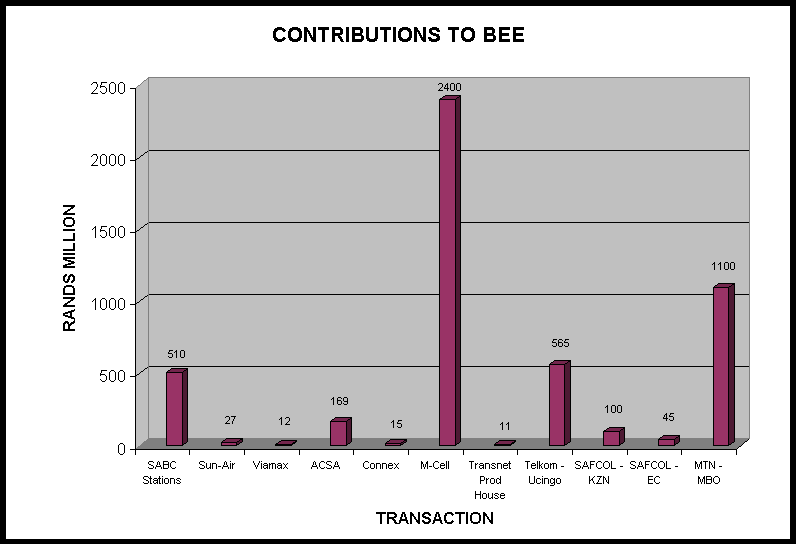
Furthermore, if we look at the proceeds from restructuring initiatives defined in terms of their contribution to BEE we can see that considerable benefits have passed through to that sector.
The implementation of employment equity and human resources development is far advanced in our SOEs than in the private sector. The commitment by Denel, Eskom and Tansnet at the Growth And Development Summit on the issue of learnerships was at the cornerstone of the gains of the GDS. Details of these were included in the packs supplied during my Budget Vote earlier this year.
SOEs are today investing more resources in activities that promote local economic developmental. Unlike in the past, SOEs investment in local activities has stopped to a large extent the "leakage" of resources. By leakage we mean resources that come into an area and immediately leave through other mechanisms.
Finally, SOEs that are able to provide basic services are crucial. Important gains have already been made over the past few years. Despite the gains of the past few years in extending basic services such as electricity, public transport, water and telephones, Government is still committed to ensuring that universal access to water and sanitation as well as basic energy is achieved by 2010. Eskom has exceeded 3 million new connections with its roll out programme, an amount in excess of its RDP requirements.
I will now focus on the progress we are making in the various restructuring initiatives that we presented to you at the beginning of the year.
I indicated at the outset that it is important to have a long-term outlook when looking back at our restructuring programme. Let me take the example of Telkom to illustrate this point.
Members will recall that the restructuring of Telkom began in earnest in 1997, following an agreement between organized labour and government on the need to acquire an SEP, to reorganize Telkom to fulfill its RDP responsibilities and to work towards an IPO for the company. Thus in 1997, the 30% share of Telkom brought the company over R4 billion to use in its roll-out programme, technology upgrades and training, whilst another R1,165 billion was transferred to the National Revenue Fund. Telkom then embarked in earnest on its RDP programme, on the basis of this injection of funds. Preparations were then begun towards the IPO that was launched in March this year. The education campaign reached over 50 000 people, mainly in rural areas in one of the largest ever economics-related public-education programmes in South Africa. Stokvels and individuals took advantage of the special Khulisa share offer, and we ended up with a situation with 100 000 new investors in capital markets, many of them rural people.
At the time, many doubted the sense of going to the marker, whilst many bemoaned the fact that we had not sold off Telkom’s family silver earlier. Once again, the results prove a contrary story:
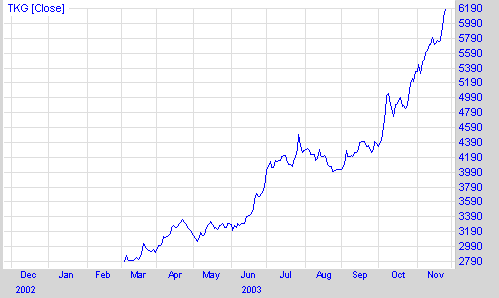
The graph shows a dramatic rise from the bottom left corner to the top right, where the investment has increased about 121% since listing for local investors. Khulisa owners, however, have seen their investment increase by 177%. In money terms, if Sipho or Baleka bought R1000 of Khulisa shares in March, their shares are today worth R2400! In anyone’s terms, these results are outstanding and unprecedented. They speak volumes for the sense of the world’s only major telecoms listing since 2001. To underline my point, let’s swing across to New York, where
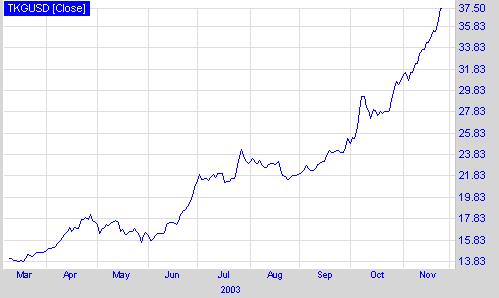
the results have taken the cynics by surprise. The value of shares has
effectively doubled and the trend seems set to continue.
What does this all mean for the citizen in the street? In brief terms, the listing of Telkom in the manner in which we did it has brought unprecedented success to people once left out of the mainstream economy, it has helped in a small way to enliven interest in economic and financial matters, and it has also proved of value to established investors and market players.
But the good news doesn’t end there. Arising from the interim results released on Monday, my colleague the Minister of Finance can shortly expect a cheque for R195 million in share dividends, paid on the back of the 90c per share of the 557 million shares available. This windfall is a result of Telkom’s strong performance and something that we can all be proud of.
Honourable Members, we are making steady progress towards the restructuring of our ports system. We have concluded the NFA consultations with Organised Labour on the future of port operations, and have reached an agreement that a mixed model would be best for the development and effective role of our ports and we have provided job guarantees, as well as protecting existing working conditions of employees.
However, this does not constitute a departure from existing Government policy. In fact, the decisions reached are consistent with the White Paper on Commercial Ports Policy, and take forward the Government’s strategic view of the role of ports. Members would recall that the consultation with Labour was on the future of ports operations, and not limited to the planned concessioning of Durban Container Terminal.
The preparatory work on the concessioning of DCT is at an advanced stage. We have since reconfigured our restructuring model to take forward some the key agreements reached with the trade union movement. Cabinet will be informed of the outcome of this process, and we should be ready to move with speed immediately thereafter.
As stated in my briefing to the Joint Committees at the beginning of the year, we are continuing with the regulatory work for the disposal of part of Eskom Generation. Honourable members, any disposal of Eskom Generation should take into account the market conditions. Currently, surveys of the market conditions indicate that we will not get value for money for this asset. It is also important that any disposal should ensure that BEE participation is enhanced in this process. Furthermore, the electricity sector is more complicated than some of the earlier pundits argued, as California, the East Coast of the USA and the London experiences have shown. We will not tamper irresponsibly with our electricity sector. Under unfavourable market conditions, it is also clear that BEE will find it difficult to finance its participation in this process.
We are on the verge of completing the various Forestry transactions by the end of this financial year ending 31 March 2004. Negotiations with the preferred bidder for MTO should be completed within the next month. Amotola will be also be completed by the end of this month, whilst the announcement of the preferred bidder for Komatiland will be announced next week. Again, let me remind members that the transfer of ownership stakes to communities living adjacent to these forests and employee ownership was the single most important benefit of our forestry restructuring.
In this way, we will ensure sustainable livelihoods for our people who will ensure that these resources are used on a sustainable basis.
A critical thing to notice is the changing face of restructuring in our country and indeed this is reflected in the changing composition of my Department officials. You will have noticed the new faces that have briefed you from time to time! The change is away from the formulation of policy that dominated our work for the first 18 months or so, through implementation of major initiatives from about 2000, and now we are beginning to shift the focus towards performance and efficient of operations, and ensuring that the quality of investment drives towards sustainable development infrastructure. The tasks of management and Boards of Directors remains steeled towards efficiency within a development context, and the strengthening of the role of public entities as agents for transformation and change in South Africa and the continent as a whole.
Honourable Members, I hope you have taken my remarks as a contribution to the development of a broader discussion on the role of SOEs in our country. The prophets of doom will surely remain amongst us, but those of us who remain committed to transformation and the democratization of the economy will know that the task we have is to change the environment we have to make South Africa a truly better place for all our people.